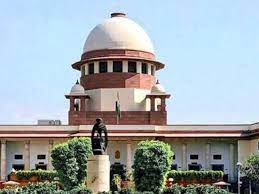Supreme Court Reserves Order on State's Power to Sub-Classify SCs, STs for Quota
By Lokmat English Desk | Published: February 8, 2024 06:31 PM2024-02-08T18:31:39+5:302024-02-08T18:32:01+5:30
The Supreme Court of India has reserved its verdict on whether state governments can create sub-classifications within Scheduled Castes ...

Supreme Court Reserves Order on State's Power to Sub-Classify SCs, STs for Quota
The Supreme Court of India has reserved its verdict on whether state governments can create sub-classifications within Scheduled Castes (SCs) and Scheduled Tribes (STs) for allocating quotas in admissions and public jobs. This decision could significantly impact affirmative action policies in the country.
Chief Justice DY Chandrachud, leading a seven-judge constitution bench, heard arguments from key figures such as Attorney General R Venkataramani, Solicitor General Tushar Mehta, senior advocate Kapil Sibal, and representatives from various states. The focus of the discussions was a review of the E V Chinnaiah judgment from 2004, which asserted that all scheduled caste communities, having endured centuries of ostracization, discrimination, and humiliation, form a homogeneous class and are not susceptible to further sub-categorization.
The panel, which also includes justices BR Gavai, Vikram Nath, Bela M Trivedi, Pankaj Mithal, Manoj Misra, and Satish Chandra Mishra, is currently considering 23 petitions, including the primary one brought by the Punjab government contesting the 2010 ruling of the Punjab and Haryana High Court.
The Supreme Court is reviewing references to reassess a 2004 verdict by a five-judge constitution bench in the case of EV Chinnaiah vs. State of Andhra Pradesh. This verdict established that Scheduled Castes (SCs) and Scheduled Tribes (STs) are homogeneous groups, thus states cannot further subdivide them to provide reservation within reservation for more marginalized and vulnerable castes within these groups. The Chinnaiah judgement had held that any sub-classification' of the Scheduled Castes would violate Article 14 (right to equality) of the Constitution.
Open in app